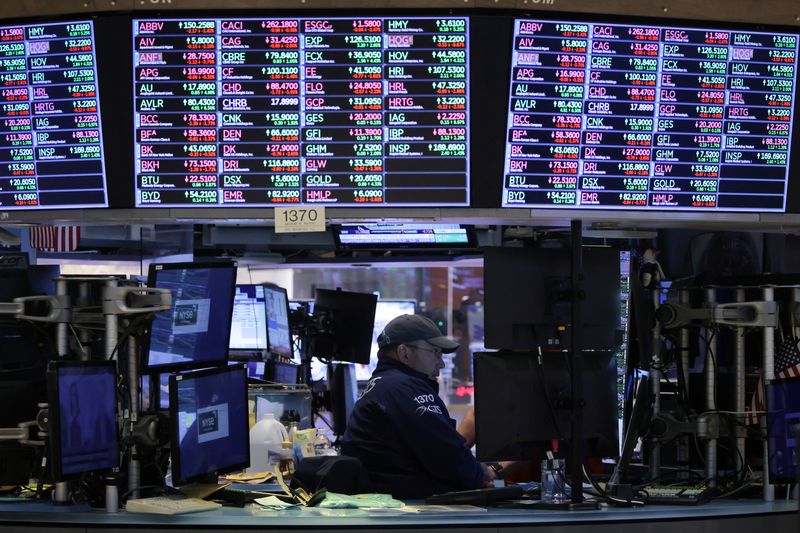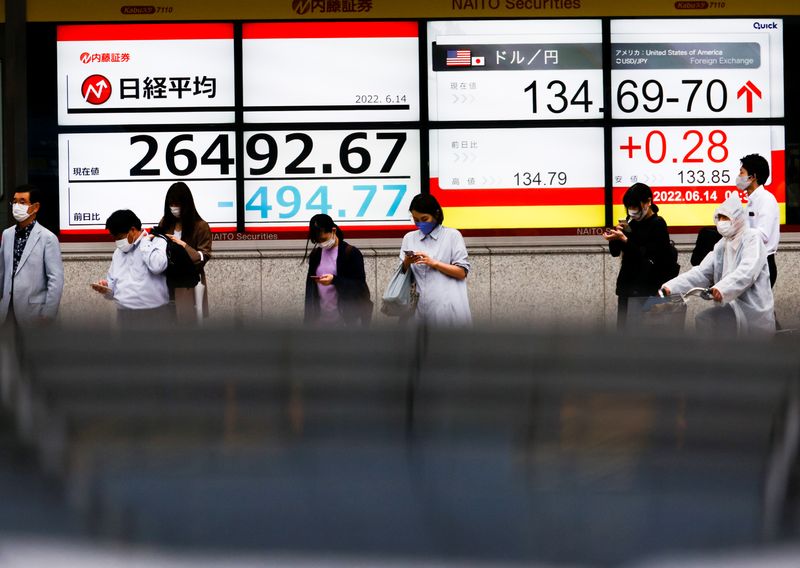By Chuck Mikolajczak
NEW YORK (Reuters) - A gauge of global stocks fell on Friday to end the trading week on a down note after five straight sessions of gains, while the dollar dipped against a basket of major currencies after soft data on U.S. business activity.
Wall Street posted modest losses in early trading but declines on the S&P 500 accelerated as Big Tech names such as Meta and Alphabet (NASDAQ:GOOGL) lost ground in the wake of earnings from Snap Inc (NYSE:SNAP), which plunged 39.08%. Defensive sectors such as utilities and consumer staples were among the few advancers.
"Every rally we have had during this bear market, there have been a number of sharp rallies and then they fade and we set new lows and that has been a pretty consistent pattern here," said Tim Ghriskey, senior portfolio strategist at Ingalls & Snyder in New York.
"Everybody is looking for the turn, everybody is trying to guess at when we get a sustained rally, and everybody is hoping for one, but to me there is still a lot of unknown ahead of us."
With 106 of the S&P 500 companies having reported earnings through Friday morning, 75.5% have topped analyst expectations, below the 81% beat rate over the past four quarters, according to Refinitiv data.
The Dow Jones Industrial Average fell 137.61 points, or 0.43%, to 31,899.29, the S&P 500 lost 37.32 points, or 0.93%, to 3,961.63 and the Nasdaq Composite dropped 225.50 points, or 1.87%, to 11,834.11.
For the week, the Dow advanced 1.96%, the S&P 500 gained 2.56% and the Nasdaq rose 3.33%. The gains for the Dow and S&P marked their biggest weekly percentage gains in four.
S&P Global (NYSE:SPGI) on Friday said its preliminary U.S. Composite PMI Output Index had tumbled far more than expected to 47.5 this month from a final reading of 52.3 in June, the first contraction in almost two years.
GRAPHIC: Flash PMI (https://graphics.reuters.com/USA-STOCKS/egpbkxeegvq/flashpmi.png)
Recent data has showed signs of a slowing economy, but the Federal Reserve is still widely expected to raise U.S. interest rates by 75 basis points at its policy meeting to combat inflation. On Thursday, the European Central Bank (ECB) raised rates by 50 basis points after weeks of indicating a 25 basis point hike was in the offing.
The pan-European STOXX 600 index closed up 0.31% and MSCI's gauge of stocks across the globe shed 0.44% after climbing to 623.79, its highest level since June 10.
The MSCI index climbed 3.1% for the week. The STOXX 600 notched in biggest weekly percentage gain in two months, in part due to easing concerns over a potential energy crisis.
The dollar lost ground on the heels of the business activity data, as investors weighed slowing economic activity against easing inflation.
The dollar index fell 0.047%, with the euro down 0.18% to $1.021.
The euro slipped in choppy trading after data showed euro zone business activity also unexpectedly contracted this month, with companies continuing to report rising costs as inflation bites, hitting consumer demand and weighing on the outlook, a survey showed.
After touching a 20-year high last week, the dollar was on track for its biggest weekly percentage decline in nearly two months.
The Japanese yen strengthened 0.98% versus the greenback at 136.05 per dollar, while Sterling was last trading at $1.2002, up 0.08% on the day.
Benchmark 10-year notes last 15.6 basis points to yield 2.7522%, after earlier hitting a two-month low of 2.732%.
"The market is quickly pricing out the possibility of the Fed being able to raise rates aggressively for the remainder of the year," said Subadra Rajappa, head of U.S. rates strategy at Societe Generale (EPA:SOGN) in New York.

ECB President Christine Lagarde said in an interview with Germany's Funke Mediengruppe published on Friday that the central bank will raise its interest rates until inflation falls back to its 2% target, her strongest comments to date about combating inflation.
U.S. crude settled down 1.71% at $$94.70 per barrel and Brent settled at $103.20, down 0.64% on the day.
